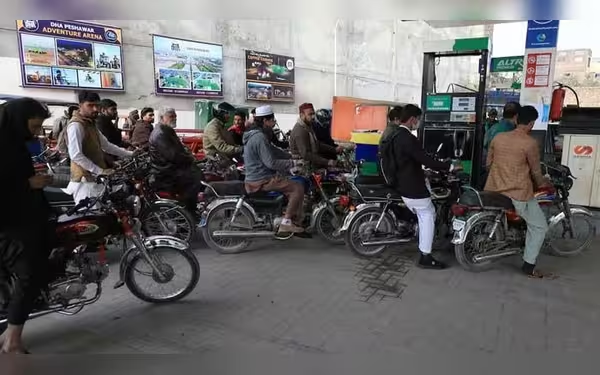Sunday, December 22, 2024 09:05 AM
Fuel Shortages Threaten Major Cities in Pakistan
- Potential fuel shortages reported in Lahore and Punjab.
- Petroleum Dealers Association warns of dwindling stocks.
- Urgent action needed to stabilize fuel supplies.
 Image Credits: thenews.com.pk
Image Credits: thenews.com.pkMany cities in Pakistan face potential fuel shortages due to supply chain issues, raising concerns for residents and businesses.
In recent weeks, many cities in Pakistan have been facing potential fuel shortages due to ongoing supply chain issues. This situation has raised concerns among residents and businesses alike, as fuel is essential for transportation and daily activities. The Petroleum Dealers Association has been closely monitoring the situation, and their insights shed light on the challenges that lie ahead.
According to Khawaja Atif, the Secretary of the Petroleum Dealers Association, there is a significant risk of a shortage of petroleum products in Lahore and throughout Punjab. He stated, "There is a chance of shortage of petroleum products in Lahore and across Punjab. Petrol stock is low at some petrol pumps in Lahore, but it has not run out yet." This statement indicates that while the situation is not dire at the moment, it is precarious and could worsen if supply issues are not addressed promptly.
In Rawalpindi, the situation appears to be similarly concerning. Chaudhry Zafar Elahi, the President of the Petroleum Dealers Association North, expressed his worries about the dwindling petrol stock at filling stations in the city. His comments highlight the urgency of the matter, as residents depend on these fuel supplies for their daily commutes and business operations.
The potential for fuel shortages can have a ripple effect on the economy and daily life. Transportation costs may rise, leading to increased prices for goods and services. Moreover, if the situation escalates, it could result in long queues at petrol stations, causing frustration among motorists. It is crucial for authorities to take proactive measures to ensure that fuel supplies are stabilized and that the public is kept informed about the situation.
While the current fuel stock may not be completely depleted, the warnings from the Petroleum Dealers Association serve as a wake-up call. It is essential for both the government and the public to remain vigilant and prepared for any potential disruptions. By staying informed and taking necessary precautions, we can navigate these challenges together and ensure that our daily lives continue smoothly.













